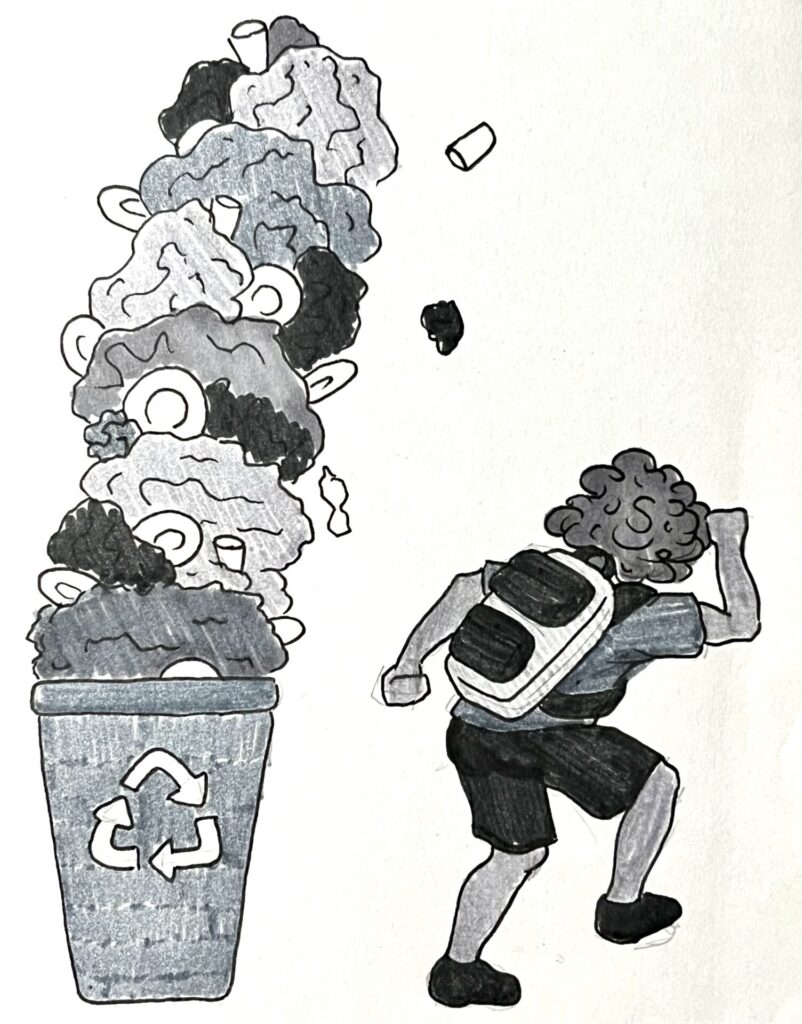Individuals need to do their part for Lewis & Clark to live up to environmental promises, sustainability

Navigating environmental sustainability is both difficult and necessary. We live in a world of assumed costs. In our daily schedules we do homework, shower and feed ourselves, all of which unforgivingly take from the environment. In this constant state of consumption we can only hope to minimize harm.
Sustainability is a choice, at times the choice between a maiming and a murder, but a choice nonetheless. It is my choice to pick a mask up off the ground, it is my choice to turn the lights off when I leave my room and it is my choice to sort recycling. The impact of that choice varies based on the system and community around the individual. If one person rinses their soda can before recycling it but another does not, that batch is still ruined and it would be as if no effort were put in at all. So there are choices that need to be communal in order to make an impact.
According to the Princeton Review, in 2015 Lewis & Clark was the most sustainable school in the country. Now, however, we have fallen to number 38. From the perspective of a student, our descent appears unsurprising. We encounter a lack of compost bins, lights on in buildings and trash cans overflowing with paper plates. These hiccups are particularly visible, but not indicative of LC’s overall environmental attitude.
Sustainability Director Amy Dvorak spoke to me about her role on campus as well as her thoughts on the ranking.
“It was easier to submit the information and now it’s really very difficult,” Dvorak said. “It’s just … not as high a priority as it used to be for us to have that external validation.”
She explained LC’s plan justification for issues in sustainability.
“Probably close to 98% of our total food waste is coming out of Templeton (Student Center)” Dvorak said. “Bon Appétit manages that really tight, they’ve got a super clean stream.”
Dvorak also noted that, much like recycling, if a single non-compostable item makes it into the bin the whole batch is ruined. Multnomah County businesses and residences have different lists of compostables and dorms count as businesses. It is difficult to justify risking student contamination when Bon Appétit is successfully handling the vast majority of waste.
Nonetheless, the Garden Club is optimistic about getting clearly-labeled compost bins into dorm kitchens, a feat more likely if we are adamant about doing it correctly. Otherwise, you can always do what I do and chuck the remains of fruits into the dense greenery all around campus.
Additionally, the Bon has certain policies that clash with our tree-hugging sensibilities, like making students take another plate when going up for seconds and the usage of disposable silverware. These policies are unfortunate but necessary in the wake of the COVID-19 pandemic — with new laws around cross contamination — and the Bon’s struggles with staffing, as they cannot always get the dishes washed in time for the next meal.
Beyond the Bon, lights are occasionally left on in classrooms and in dorms when no one is there, which is something that happens everywhere, but should still be minimized. Dvorak is working on a reporting system in which facilities can be notified.
Finally, when trash cans do overflow it is either because the solar-powered compaction function is not being employed — which could be better advertised — or because the Black-owned, waste management company City of Roses that services LC receives less funding than larger companies and as a result occasionally has hiccups. Additionally, City of Roses is primarily a recycling firm, so they are more motivated to preserve recycling than most other companies because that is their source of profit.
The Office of Sustainability, Students Engaged in Eco-Defense (SEED) and Garden Club are all working to bring new positive forces to campus. The former is raising funding for an in-vessel composter so LC can compost separately from the city. The latter two are trying to get solar panels for the garden shed and apiary to charge equipment and keep the bees healthy.
LC as an institution is doing a significantly better job than many others. Although the over-admittance of students and modification of functioning buildings are still having negative effects, a lot of the remaining issues fall on us. That is not to say that college students, who may be struggling financially, are those primarily at fault in catalyzing climate change, or that we even can do the most to curb it, but that we are willing to do more for the environment than many people. If we can make a difference we should.
We have a community of bright, environmentally-conscious individuals. If we do our part to staff the Bon, flood Dvorak’s inbox with sincere requests for compost bins and make sure to do the little things like picking up trash and turning off the lights, we can prolong the life of our planet and the vibrancy of its wonders.
Subscribe to the Mossy Log Newsletter
Stay up to date with the goings-on at Lewis & Clark! Get the top stories or your favorite section delivered to your inbox whenever we release a new issue.

Leave a Reply